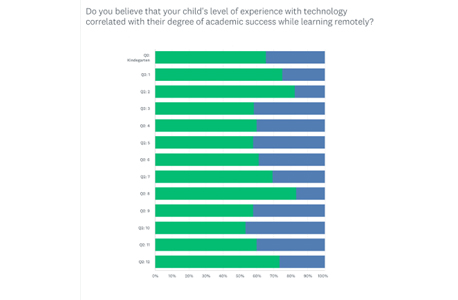Digital Literacy Workshops Summer 2022
In 2022, I received the George H.P Dwight Research Grant Award from Groton School. I used my Dwight Grant to resource a research and community engagement project in the Philadelphia Region, where I’ve grown up. I chose to focus on K-12 students’ digital literacy — essentially assessing their skills and comfort with respect to technology. The Covid-19 Pandemic exposed and exacerbated severe disparities in students’ access to devices, internet connections, and other academic resources. As a result, there are large inequities in K-12 education that disproportionately burden certain demographics. In addition to widening the socioeconomic divides in the United States, poor rates of digital literacy are a threat to national security as America seeks to remain strategically and economically competitive in an increasingly digitized world. In order to study the scale of the issue, I divided my Grant into two components:
A. With input from Professor Fernando Reimers of the Harvard Graduate School of Education and a graduate fellow at the UPenn GSE, I designed a series of five-day digital literacy workshops to be held at local libraries. Their curriculum was meant to both gauge participants’ prior experiences with technology and also enhance their ability to harness it in their academic endeavors. Though it was challenging to craft a program that would engage students with a wide spectrum of backgrounds and experiences, countless revisions and guidance from numerous educators resulted in a successful final program, and I hope to employ the model again in the future.
B. With the other part of the Grant, I conducted a nationwide poll that surveyed hundreds of parents on their experiences with academic technology during the Covid-19 Pandemic. The resulting data provided incredibly helpful insight to certain geographic, cultural, economic, and other demographic trends that may have affected student outcomes.
I plan to meet with local policymakers later this summer to discuss reforms in K-12 education that would address these disparities.

The Digital Literacy Project
Description
In the summer of 2022, The Rejuvenate Project designed a series of workshops to be hosted in libraries across the Delaware Valley. These programs center around digital literacy with four main themes:
- Critical Thinking
- Problem Solving
- Collaboration
- Leadership
The workshop programs are intended to introduce participants (elementary and early middle school-aged youth) to aspects of digital literacy and gain an in-depth understanding of how technology can be harnessed to enhance their academic and creative endeavors.
Visualizing Disparities
Description: In 2022, The Rejuvenate Project surveyed hundreds of parents across the country to gauge sentiment and experiences regarding educational technology, particularly throughout the Covid-19 pandemic. The resulting data demonstrate trends that reveal immense educational and access disparities among certain geographic, socioeconomic, racial, and other demographic lines.
Figure 1
In some parts of the US, nearly 6 out of every 10 students either had limited access to the internet at home or had to completely relocate.
Across the nation, K-12 students had varying degrees of access to the internet during remote learning caused by the COVID-19 Pandemic. While in some parts of the nation the majority of students had continuous access to high-speed internet, in others, over 60% encountered some level of internet connectivity issues.
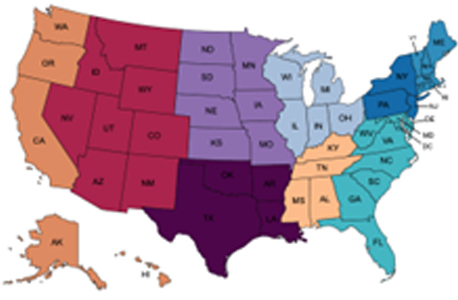
Figure 2
According to the poll, different community environmental circumstances correlated with the amount of technical difficulty that students encountered when virtually learning. Suburban students fared best in this respect, with rural ones slightly worse off and urban students dealing with problems at a significantly higher rate.
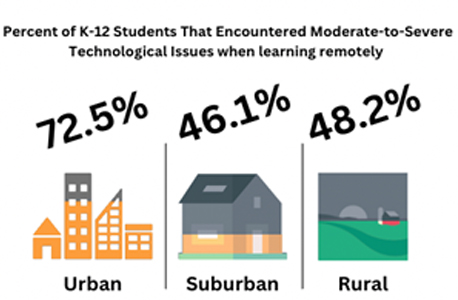
Figure 3
It is evident that there is a direct relationship between a family’s household income (compared in $25,000 brackets) and their estimation of their child’s digital skills, with wealthier families being more likely to say that their child had “excellent” skills.
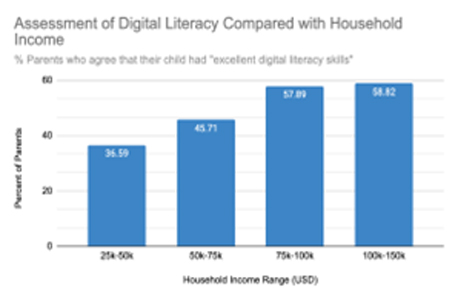
Figure 4
The data showed significant disparities along racial lines in terms of how parents gauged the impact of remote learning on the student’s education.
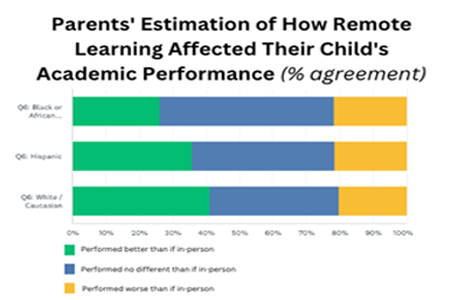
Figure 5
Regardless of demographic indicators, parents of students at virtually every K-12 level overwhelmingly agreed that their student’s prior technological experience ultimately impacted their academic performance during remote learning.
